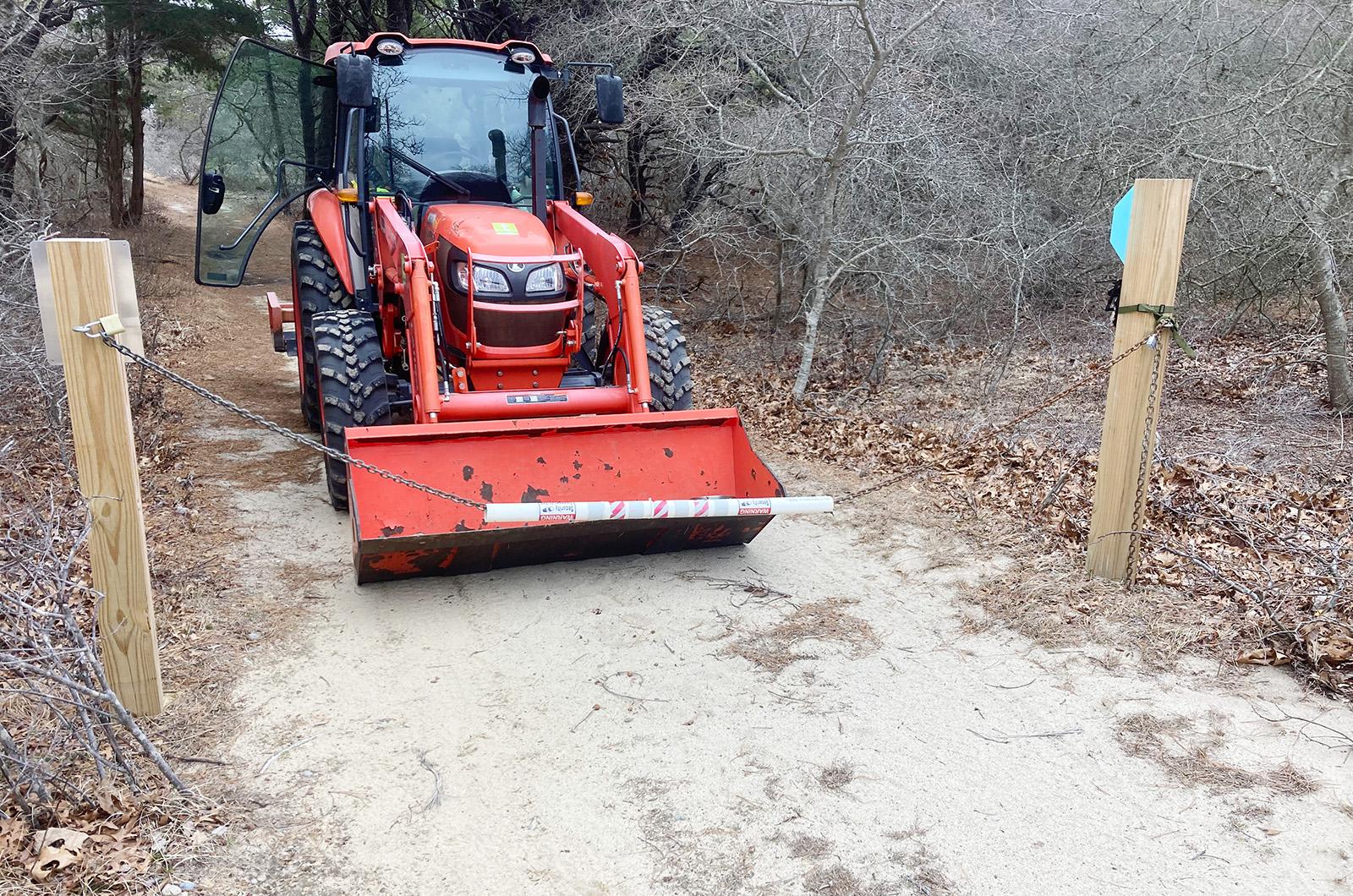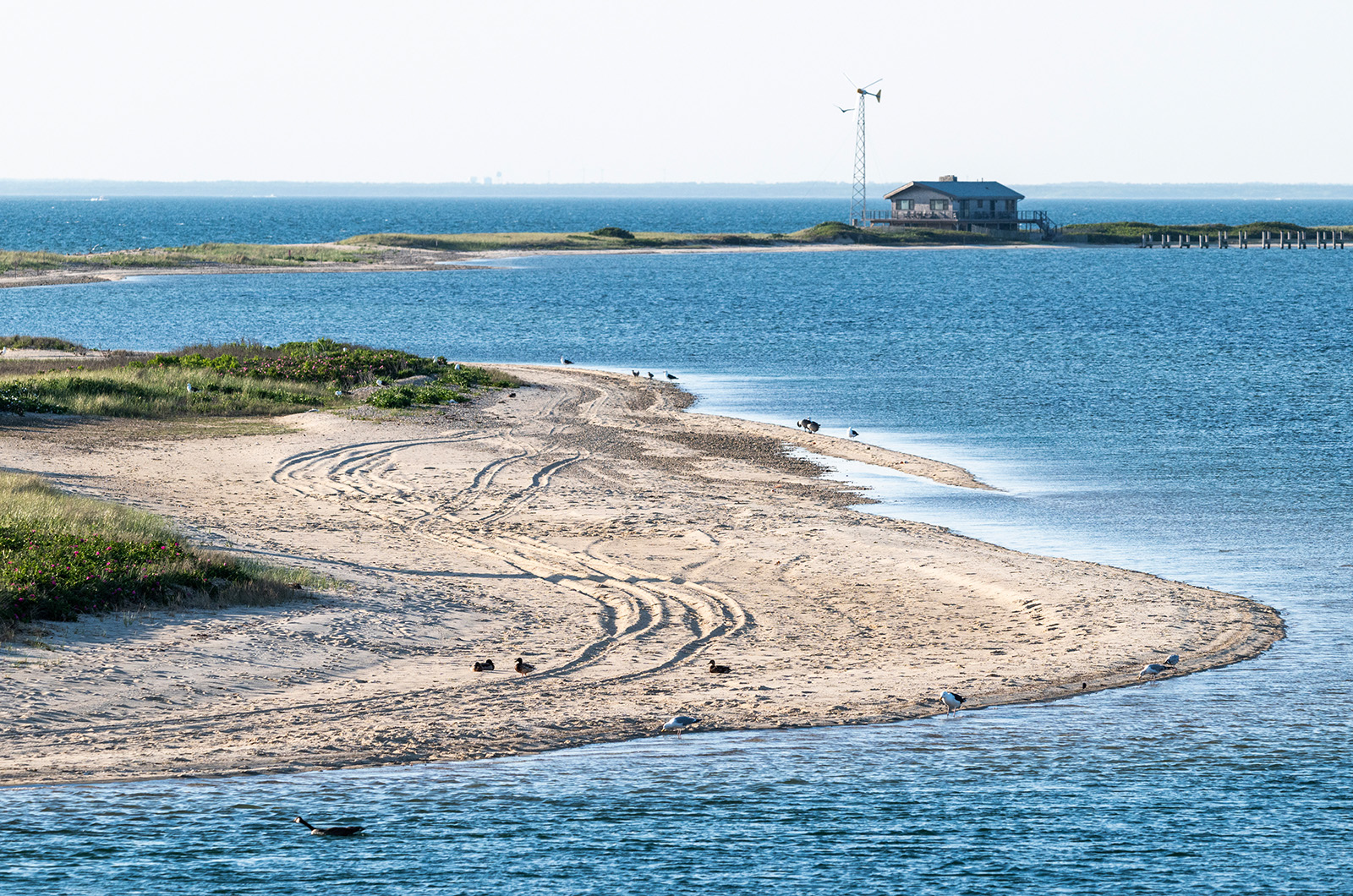The sandy off-road vehicle trails of Chappaquiddick seem to be leading to a new destination as of late: a courtroom.
The Trustees of Reservations, which manages miles of oversand vehicle trails on the island, filed a lawsuit in the state Land Court this week, alleging that a group of landowners have erected a locked gate across a trail that blocks the Trustees from accessing the nonprofit’s Cape Pogue Wildlife Refuge. This is now the fifth appeal over trail access in four years.
The Trustees have called on the court to order the landowners to give the Trustees the ability to open the gate to allow them the use of the trail, according to the 13-page suit, filed on Tuesday.
“This unlawful situation obstructs Trustees staff from monitoring critically endangered wildlife and land we conserve for the public good on the Cape Pogue Wildlife Refuge,” Katie Theoharides, the president and CEO of the Trustees, said in a statement. “We take seriously our obligations under local, state, and federal law to manage these properties and protect and monitor the rare and endangered species that nest in the Refuge, and we will work to ensure that access to this critical habitat is restored.”
The gate was installed at Shear Pin Lane in March and blocks access to the Road to the Gut, one of the only reliable trails to the winding tip of Cape Pogue, according to the suit. The Trustees claim the nonprofit has the ability to use the trail as part of an 1891 court order that divided the Cape Pogue land where the gate sits between several property owners.
Landowners Edward Self Jr., Judith Self Murphy, Jay Osler, Erin Michaud and Mark Osler are all being sued by the Trustees in the case. Relatives of the five defendants have owned land on Cape Pogue for generations, and previously have raised concerns about the Trustees management of the delicate spit.
The Trustees said they have the right to use the Road to the Gut trail, which was affirmed in a Land Court case from 2022. In a statement, the nonprofit said it had repeatedly reached out to Cape Pogue residents with requests to unlock the gate and was left with no other choice but to turn to the courts.
In a statement to the Gazette on Wednesday, the landowners said they were surprised to learn of the suit through a press release, particularly given their historical cooperation with the Trustees as a neighbor. The gate, which the landowners said is at the boundary of a private lot, was installed in February following incidents of trespassing and property damage across multiple Cape Pogue properties, according to the statement.
The landowners noted that the Trustees have formal agreements across other privately held lots on Cape Pogue, but no such agreement exists for the lot in question. They also disputed the claim that Trustees cannot access their land, saying there are alternative routes to get to the Cape Pogue properties.
“They have access today,” they wrote. “While we understand the inland road offers convenience, this gate is not preventing their access.”
The Trustees did apparently have the ability to open the gate at one point, according to court documents. The Trustees Island director Darci Schofield reached out to a property owner in April after the gate was discovered the week prior. The Cape Pogue resident provided the combination, but shortly thereafter the lock or combination was changed, Ms. Schofield wrote in an affidavit.
If the Trustees is not able to get past the gate, the organization said it could struggle to maintain its 50 acres of wildlife refuge west of the Cape Pogue Lighthouse, a prospect that has also caused alarm for members of the public.
“Cape Pogue is one of the Island’s most sensitive ecological areas,” said Chris Kennedy, a former superintendent for the Trustees. “Undermining environmental protection to push a private agenda is not only irresponsible — it’s unlawful.”
The landowners said they would have welcomed a conversation with the Trustees about access before legal action was taken, but given where things stand now, they believed the Land Court will uphold the principles of private property rights.
Still, they may be open to talks moving forward.
“For generations, vehicle travel along this inner road through private property has been permitted to both the public and [the Trustees] in a spirit of cooperation,” they wrote. “In that same spirit, we remain open to constructive dialogue with [the Trustees] to reach a balanced solution that respects both their desire for convenient access and the established rights of private landowners.”
As the dispute over the gate plays out, another lawsuit over trail access is moving closer to a trial. In 2022, Chappaquiddick property owners Victor and Dawn Colantonio sued the Trustees, claiming that the Trustees’ practice of selling permits that allow the public to drive out on the trails overburdens a shared easement.
The Trustees and property owners in that case met last week to discuss whether a trial was needed. If it is, a trial wouldn’t take place before July.
The Trustees also sued the Edgartown Zoning board of appeals in July 2024 after the board made the Trustees reapply for a permit after its original permit from 1990 couldn’t be found in town hall. That case was settled.
In a separate dispute with the state Department of Environmental Protection, both Chappaquiddick residents, including some in the gate case, and the Trustees filed appeals over limits on oversand vehicle traffic on Chappaquiddick set by the Edgartown conservation commission.
Another group of residents have also contested plans to reroute one of the trails to make up for sea level rise.
A next date in the gate case has not yet been set by the court.







Comments (9)
Comments
Comment policy »